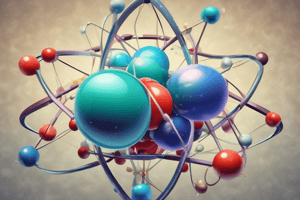Podcast
Questions and Answers
Who is considered a physicist?
Who is considered a physicist?
- A mathematician
- A scientist who studies plants
- A scientist who specializes in the field of physics (correct)
- A historian
Physics is one of the oldest academic disciplines.
Physics is one of the oldest academic disciplines.
True (A)
What is the Latin origin of the word 'physics'?
What is the Latin origin of the word 'physics'?
physica
Early civilizations had a predictive knowledge of the motions of the Sun, Moon, and stars, often worshipped as ______.
Early civilizations had a predictive knowledge of the motions of the Sun, Moon, and stars, often worshipped as ______.
Match the scientist with their contribution in optics:
Match the scientist with their contribution in optics:
In which century did physics become a discipline distinct from philosophy and other sciences?
In which century did physics become a discipline distinct from philosophy and other sciences?
Physics deals with a wide variety of systems, although certain theories are only used by specialized physicists.
Physics deals with a wide variety of systems, although certain theories are only used by specialized physicists.
What is the branch of physics concerned with bodies acted on by forces and bodies in motion?
What is the branch of physics concerned with bodies acted on by forces and bodies in motion?
The study of how sound is produced, controlled, transmitted, and received is called ________.
The study of how sound is produced, controlled, transmitted, and received is called ________.
Match the branch/topic of classical physics with its description:
Match the branch/topic of classical physics with its description:
What is the standard consensus about the laws of physics?
What is the standard consensus about the laws of physics?
Physicists use the scientific method to test the validity of physical theories.
Physicists use the scientific method to test the validity of physical theories.
What did the ancient Chinese observe about certain rocks?
What did the ancient Chinese observe about certain rocks?
Particle physics is the study of the elementary constituents of matter and energy and the interactions between them. The interactions of elementary particles and fields are described by the ______.
Particle physics is the study of the elementary constituents of matter and energy and the interactions between them. The interactions of elementary particles and fields are described by the ______.
Match the following fields of physics with their descriptions:
Match the following fields of physics with their descriptions:
What is creating the ENA ribbon along the termination shock of the solar wind?
What is creating the ENA ribbon along the termination shock of the solar wind?
What is one of the main areas of unsolved theoretical problems in condensed matter physics?
What is one of the main areas of unsolved theoretical problems in condensed matter physics?
The Large Hadron Collider has proved the existence of supersymmetry.
The Large Hadron Collider has proved the existence of supersymmetry.
The first pieces of experimental evidence for physics beyond the Standard Model involve the indications that neutrinos have non-zero ___.
The first pieces of experimental evidence for physics beyond the Standard Model involve the indications that neutrinos have non-zero ___.
Match the following areas of ongoing research in physics with their descriptions:
Match the following areas of ongoing research in physics with their descriptions:
Flashcards are hidden until you start studying
Study Notes
Physics: The Natural Science of Matter
- Physics involves the study of matter, its fundamental constituents, its motion and behavior through space and time, and the related entities of energy and force.
- It is one of the most fundamental scientific disciplines and one of the oldest academic disciplines.
Ancient Civilizations and Early Contributions
- Early civilizations, such as the Sumerians, ancient Egyptians, and the Indus Valley Civilisation, had a predictive knowledge of astronomy and a basic awareness of the motions of the Sun, Moon, and stars.
- The ancient Greeks, such as Thales, rejected non-naturalistic explanations for natural phenomena and proclaimed that every event had a natural cause.
- Aristotle's physics was not scrutinized until John Philoponus, a Byzantine scholar, questioned Aristotle's teaching of physics and noted its flaws.
Medieval European and Islamic Contributions
- In the sixth century, Isidore of Miletus created an important compilation of Archimedes' works.
- John Philoponus introduced the theory of impetus, which was a step toward the modern ideas of inertia and momentum.
- Islamic scholarship inherited Aristotelian physics from the Greeks and developed it further, placing emphasis on observation and a priori reasoning.
Aristotle's Physics
- Aristotle believed that each of the four classical elements (earth, fire, water, air) had its own natural place due to their differing densities.
- He stated that when a small amount of one element enters the natural place of another, the less abundant element will automatically go towards its own natural place.
- Aristotle called his metaphysics "first philosophy" and characterized it as the study of "being as being".
- He defined the paradigm of motion as a being or entity encompassing different areas in the same body.
Classical Physics
- Classical physics became a separate science when early modern Europeans used experimental and quantitative methods to discover what are now considered to be the laws of physics.
- Major developments in this period include the replacement of the geocentric model of the Solar System with the heliocentric Copernican model.
Modern Physics
- Modern physics began in the early 20th century with the work of Max Planck in quantum theory and Albert Einstein's theory of relativity.
- Quantum mechanics would come to be pioneered by Werner Heisenberg, Erwin Schrödinger, and Paul Dirac.
- The Standard Model of particle physics was derived from this early work, and physics beyond the Standard Model is an active area of research.
Philosophy of Physics
- Physics stems from ancient Greek philosophy, and many physicists have written about the philosophical implications of their work.
- The development of physics has answered many questions of early philosophers and has raised new questions.
Core Theories
- Classical mechanics, quantum mechanics, thermodynamics, and statistical mechanics, electromagnetism, and special relativity are the central theories in physics.
- Each of these theories was experimentally tested numerous times and found to be an adequate approximation of nature.
Branches of Physics
- Classical physics includes the traditional branches of mechanics, acoustics, optics, thermodynamics, and electromagnetism.
- Modern physics is concerned with the behavior of matter and energy under extreme conditions or on a very large or very small scale.
Fundamental Concepts in Modern Physics
- The laws of classical physics accurately describe systems whose important length scales are greater than the atomic scale and whose motions are much slower than the speed of light.
- Quantum theory and the theory of relativity find applications in many areas of modern physics.### Relation to Other Fields
- Mathematics provides a compact and exact language to describe the order in nature, as noted by Pythagoras, Plato, Galileo, and Newton.
- The laws of logic express universal regularities found in the structural features of the world, which may explain the peculiar relation between mathematics and physics.
- Physics uses mathematics to organize and formulate experimental results, while mathematics is concerned with abstract patterns, even beyond the real world.
- Ontology is a prerequisite for physics, but not for mathematics, meaning physics is ultimately concerned with descriptions of the real world, while mathematics is concerned with abstract patterns.
Pure Physics
- Physics is a branch of fundamental science, also called basic science.
- Physics is also called "the fundamental science" because all branches of natural science like chemistry, astronomy, geology, and biology are constrained by laws of physics.
- Chemistry is often called the central science because of its role in linking the physical sciences.
Applied Physics
- Applied physics is a general term for physics research intended for a particular use.
- Applied physicists use physics in scientific research, aiming to develop new technologies or solve problems.
- Physics is used heavily in engineering, with applications in statics, acoustics, optics, and forensic investigations.
Research
- Physicists use the scientific method to test the validity of a physical theory.
- The scientific method involves a methodical approach to compare the implications of a theory with the conclusions drawn from its related experiments and observations.
- Experiments are performed and observations are made to determine the validity or invalidity of a theory.
- Scientific laws are concise verbal or mathematical statements of a relation that expresses a fundamental principle of a theory.
Scope and Aims
- Physics covers a wide range of phenomena, from elementary particles to the largest superclusters of galaxies.
- Physics aims to describe the various phenomena that occur in nature in terms of simpler phenomena.
- Physics hopes to find an ultimate reason (theory of everything) for why nature is as it is.
Research Fields
- Contemporary research in physics can be broadly divided into:
- Nuclear and particle physics
- Condensed matter physics
- Atomic, molecular, and optical physics
- Astrophysics
- Applied physics
- Each field has its own subfields, theories, and concepts.
Nuclear and Particle Physics
- Particle physics is the study of the elementary constituents of matter and energy and the interactions between them.
- The Standard Model describes the interactions of elementary particles and fields, including the Higgs boson.
Atomic, Molecular, and Optical Physics
- Atomic, molecular, and optical physics studies the interactions of matter and light on the scale of single atoms and molecules.
- The three areas are grouped together because of their interrelationships, the similarity of methods used, and the commonality of their relevant energy scales.
Condensed Matter Physics
- Condensed matter physics deals with the macroscopic physical properties of matter.
- It is concerned with the "condensed" phases that appear whenever the number of particles in a system is extremely large and the interactions between them are strong.
Astrophysics
- Astrophysics is the application of the theories and methods of physics to the study of stellar structure, stellar evolution, the origin of the Solar System, and related problems of cosmology.
- Astrophysicists apply many disciplines of physics, including mechanics, electromagnetism, statistical mechanics, thermodynamics, quantum mechanics, relativity, nuclear and particle physics, and atomic and molecular physics.
Current Research
- Research in physics is continually progressing on a large number of fronts, including:
- Condensed matter physics
- Particle physics
- Astrophysics
- Complex systems and chaos theory
Studying That Suits You
Use AI to generate personalized quizzes and flashcards to suit your learning preferences.




